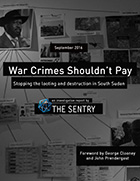
Note: This blog contains excerpts from the full report.
Following a two-year investigation into the assets and wealth of top officials in South Sudan’s government and opposition, Enough’s initiative The Sentry has released its first findings in a new report, War Crimes Shouldn’t Pay: Stopping the Looting and Destruction of South Sudan .
Watch the recording of The Sentry Press Conference below:
Since the beginning of the conflict in South Sudan in 2013, tens of thousands of people have lost their lives, 2.3 million people have been displaced, and 5.1 million people—almost half the country’s population—require food assistance. Mass rape has been used as a weapon of war and children are routinely recruited as soldiers and sent as cannon fodder into combat. Throughout all of this horror and destruction, rival kleptocratic networks led by President Kiir and Vice President Machar have been manipulating and exploiting ethnic divisions, and competing not for the best interests of their country, but rather for the grand prize – control over state assets and the country’s abundant natural resources.
This report provides evidence that highlights the link between this systemic corruption and violent conflict, including the mass atrocities committed during the civil war. The Sentry’s investigation focused on top officials identified by the United Nations and African Union as having command authority over military operations that resulted in widespread human rights crimes since December 2013, including:
-
President Salva Kiir
-
Vice President Riek Machar
-
General Paul Malong Awan, chief of staff of the SPLA
-
General Malek Ruben Riak, deputy chief of staff of the SPLA for logistics in charge of military procurement
-
General Gabriel Jok Riak, an SPLA general under UN sanctions
The Sentry found evidence, which the report details, that top officials and their families have enjoyed luxurious homes outside South Sudan and have been involved in commercial ventures throughout the country’s most lucrative business sectors. Some have even received payments into their personal bank accounts from foreign corporations. War Crimes Shouldn’t Pay also describes the international network of collaborators that allows South Sudan’s violent kleptocrats to move money with ease and enjoy the spoils of war, from banks to lawyers to international war profiteers.
Critically, the report proposes a new strategy to use this information in a way that could effectively counter atrocities, by using the tools of financial pressure normally reserved for countering terrorism, organized crime, and nuclear proliferation for two purposes: first, to bring to account those responsible for these abuses, individuals who until now have been able to operate with near impunity because the world imposes no consequences for their behavior; and second, to create significant and heretofore missing international leverage by impacting the cost-benefit analysis of those leaders away from violence, atrocities and corruption and toward peace, human rights, and transparency.
To do so, War Crimes Shouldn’t Pay elaborates on the following areas in which the international community must work to create accountability and leverage:
1. Targeted Sanctions
-
President Obama should issue an Executive Order on South Sudan that focuses on corruption.
-
Sanctions must focus on high-impact targets in South Sudan.
-
The facilitators and enablers of corruption and mass atrocities should be priority targets for sanctions designations.
-
Sanctions designations should also target the ultimate beneficiaries of corruption.
-
The U.S. Department of the Treasury should ensure that sanctions imposed on the perpetrators of abuses in South Sudan are vigorously enforced.
2. Anti-Money Laundering Measures
-
The U.S. government should penalize any banks that have failed to fulfill their due diligence, reporting, and compliance requirements in South Sudan.
-
The U.S. Department of the Treasury should issue an investigative request under Section 314(a) of the USA PATRIOT Act.
-
FinCEN should commence a 311 Action against South Sudanese politically exposed persons (PEPs) engaging in real estate transactions.
-
Authorities should work to seize and repatriate funds looted from South Sudan.
-
The U.S. government should directly engage with banks and foreign governments about money laundering concerns pertaining to South Sudan.
3. Mitigating collateral damage and unintended consequences.
-
U.S. authorities should be specific and transparent with banks about the nature of laundering concerns in South Sudan in order to avoid derisking and other negative consequences.
-
FinCEN should take steps to improve the ability of banks to conduct effective due diligence on South Sudan-related clients at a reasonable cost.
4. Put Corruption “Front and Center” in South Sudan
-
Support the development of robust oversight and accountability mechanisms.
-
Immediate family members of South Sudanese PEPs should be required to declare their assets.
-
South Sudan should create a searchable public registry of all corporate entities formed in the country.
-
A dual-key financial management system should be introduced as a temporary measure to prevent violent kleptocrats from hijacking state institutions and looting public resources.
-
Conduct a retrospective review of the allocation of government contracts and natural resource concessions.
-
Create and protect space for civil society to act as a watchdog.
Learn More about The Sentry Here>

